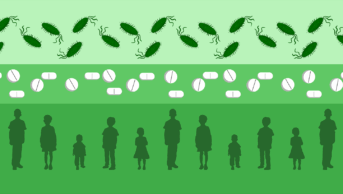
Shutterstock.com
“You made the impossible, possible.” That was the remark of a patient’s mother once we were able to successfully vaccinate her child.
It was this comment that convinced me that all healthcare professionals should understand the various ways in which they can help and support patients with learning disabilities and autism (LDA), so that parents or carers never again think it is “impossible” to get the right treatment or care.
Before I joined North East London NHS Foundation Trust (NELFT) back in 2020, I wouldn’t say I had an expert level of knowledge and expertise in LDA. My experience was more in general mental health and secure environments. But taking on this role has been the best decision of my career to date. I have had the privilege of leading on and being part of numerous projects that have led to bettering the lives of this vulnerable population group.
I started up the Stop Over Medicating People (STOMP) project from scratch: it had never been done at the trust before. It involved working with a team who had never worked with a pharmacist, and it came with great challenges. But I overcame these through perseverance and a great support system through my mentor and line manager.
The STOMP project allows for a holistic review of the prescribing of inappropriate medication. Patients and their carers are invited for an initial assessment with the pharmacist and consultant, where the rationale behind proposing a reduction plan is explained. Once a reduction plan is agreed, a letter is sent to the GP to request changes to medication. The aims are to raise awareness and reduce side effects from medication, and improve patients’ quality of life.
The most common side effects recorded in patients were slowing of movements, tiredness and difficulty in concentrating; all these improved markedly after the STOMP intervention
STOMP now runs successfully across the four boroughs within NELFT. To date, 180 patients have been identified as meeting the STOMP criteria: diagnosis of a learning disability, no diagnosis of a mental health condition and prescribed psychotropic medication. Of these, 165 patients have been placed on medication reduction plans, and 37 patients have been taken off medication completely. The most common side effects recorded in these patients were slowing of movements, tiredness and difficulty in concentrating; all these improved markedly after the STOMP intervention.
Patient and carer testimonials have been very positive and really show how the project has improved patients’ quality of life. The STOMP project was a finalist for the Health Service Journal (HSJ) Patient Safety Awards in 2021. However, it did not stop there. During the implementation of the STOMP programme, I was faced with another challenge: ensuring this population group were able to access the COVID-19 vaccine.
There were concerns that certain patients with LDA may not be able to have their vaccine at mainstream services, owing to a fear of large crowds, loud noises, queues or needles. As the specialist pharmacist for LDA, I took a lead on the programme, ensuring patients had appropriate access and support to get the vaccine safely.
We set up a new service that provided a pathway to improve access for vulnerable patients with LDA across localities in north east London. This involved engagement and communication with partners, including GPs, primary care networks and clinical commissioning groups, to develop a clear referral pathway.
The pathway ensured that reasonable adjustments, such as desensitisation, distraction methods and home visits, were in place for those patients who needed extra support to receive their vaccine. This led to an overall increase in the LDA vaccination uptake for north east London.
One parent told us that if it were not for us, her daughter would not have had her vaccine: “You took time to find out about S’s needs before your visit and discussed what strategies could be used to help; she was so happy and this defused any anxiety she had and made her feel proud.” The work was recognised and was an overall category poster winner for the HSJ Patient Safety Awards and a finalist for the general practice awards.
Now that the STOMP project is running successfully in the background, and can be supported by a rotational band 7 pharmacist, I have decided to focus on other areas where my skills as a pharmacist could be used to help further improve the treatment and quality of life for people with LDA. These include working in collaboration with primary care on improving the annual health checks delivered to patients in primary care and devising a new assessment for the learning disability module of the postgraduate pychiatric pharmacy diploma for Aston University.
When I think about my future and next steps, I get really excited because there is so much more that can be done in this area to help better the lives of people with LDA. I want to replicate the STOMP work that has been done in children’s services, and I hope to continue to build a strong team and a workforce that will lead to the development of a consultant pathway. Wouldn’t it be a great achievement to become the first learning disability consultant pharmacist in the country?
Rizwana Dudhia is lead pharmacist for learning disabilities and autism at North East London NHS Foundation Trust

Health inequalities
The Royal Pharmaceutical Society’s policy on health inequalities was drawn up in January 2023 following a presentation by Michael Marmot, director of the Institute for Health Equity, at the RPS annual conference in November 2022. The presentation highlighted the stark health inequalities across Britain.
While community pharmacies are most frequently located in areas of high deprivation, people living in these areas do not access the full range of services that are available. To mitigate this, the policy calls on pharmacies to not only think about the services it provides but also how it provides them by considering three actions:
- Deepening understanding of health inequalities
- This means developing an insight into the demographics of the population served by pharmacies using population health statistics and by engaging with patients directly through local community or faith groups.
- Understanding and improving pharmacy culture
- This calls on the whole pharmacy team to create a welcoming culture for all patients, empowering them to take an active role in their own care, and improving communication skills within the team and with patients.
- Improving structural barriers
- This calls for improving accessibility of patient information resources and incorporating health inequalities into pharmacy training and education to tackle wider barriers to care.


